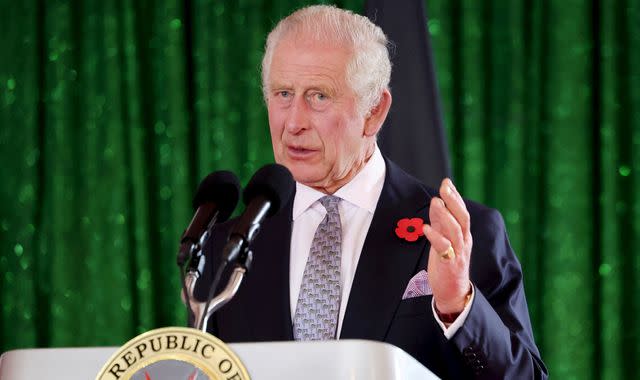King Charles in Kenya: Monarch says there is 'no excuse' for 'unjustifiable acts of violence' during British rule

The King has said there is "no excuse" for "abhorrent and unjustifiable acts of violence" committed by the British against Kenyans in the past, during a speech at a state banquet in the country.
Past wrongs during colonial rule are a cause of the "greatest sorrow and deepest regret," the monarch added.
The King, who was accompanied by the Queen, was welcomed to the east African country by President William Ruto and the first lady as they began a four-day state visit.
Before the visit, there were renewed calls for the King to say sorry from the Kenyan Human Rights Commission, who have requested an "unequivocal public apology", and from those whose relatives suffered abuse, particularly during the Mau Mau uprising in the 1950s.
After briefly acknowledging his own personal connections to Kenya and those of his wider family, including Queen Elizabeth II leaving the country as the new monarch after the death of her father in 1952, the King addressed the "shared history" of the two nations.
"It is the intimacy of our shared history that has brought our people together. However, we must also acknowledge the most painful times of our long and complex relationship," he said.
"The wrongdoings of the past are a cause of the greatest sorrow and the deepest regret."
The monarch said there were "abhorrent and unjustifiable acts of violence committed against Kenyans as they waged, as you said at the United Nations, a painful struggle for independence and sovereignty," adding that there can be "no excuse".
"In coming back to Kenya, it matters greatly to me that I should deepen my own understanding of these wrongs, and that I meet some of those whose lives and communities were so grievously affected," he said.
"None of this can change the past," he continued, adding that by addressing the history with "honesty and openness" the two countries can "perhaps demonstrate the strength of our friendship today".
He concluded: "And, in so doing, we can, I hope, continue to build an ever-closer bond for the years ahead."
Read more:
Niece of Kenyan 'murdered by UK soldier' writes to King
State visit to Kenya will acknowledge 'painful aspects'
Ninety thousand Kenyans were murdered, tortured or maimed, with many held in detention camps during the Mau Mau uprising.
It marked the beginning of a campaign to end British rule in Kenya, with atrocities committed on both sides.
A decade ago the British government expressed regret and paid out nearly £20m in compensation, but ministers never apologised.
The King is expected to meet veterans and give his blessing to efforts by the Commonwealth War Graves Commission, which aims to ensure Kenyans and Africans who helped Britain in the World Wars are commemorated properly, later in his trip.
He also plans to visit Nairobi National Park and meet with environmental activist Wanjira Mathai, the daughter of late Nobel laureate Wangari Maathai, as he commits to environmental protection.
The royal visit this year coincides with the 60th anniversary of Kenyan independence, and a key goal of the UK government for the trip was to focus on friendship and future relations.


